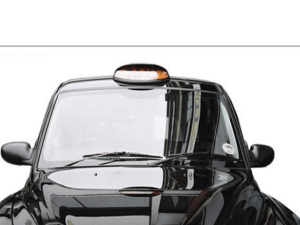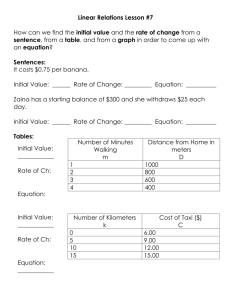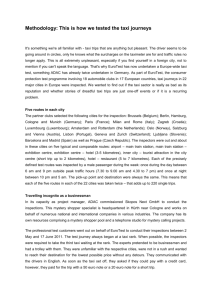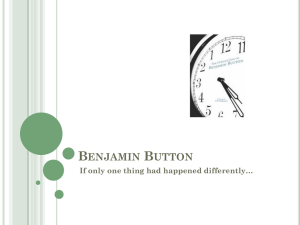Taxi Driver, Code of Conduct
advertisement
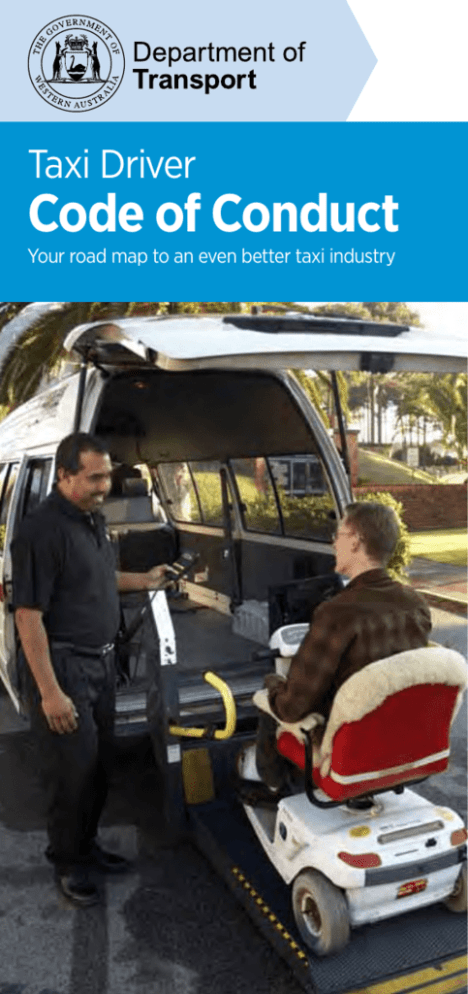
Taxi Driver Code of Conduct Your road map to an even better taxi industry Introduction As a taxi driver, you provide an important personalised transport service to the public. The way you drive, dress, talk and act affects the way passengers feel about each taxi trip they take with you. To encourage passengers to want to keep using your service, you must provide good customer service and conduct yourself in a way that makes them comfortable and at ease. If you and all other taxi drivers act by the WA Taxi Driver Code of Conduct (the Code), the result will be greater customer satisfaction and increased confidence in the taxi industry. The Department of Transport (DoT) developed the Code to clearly describe: • behaviour that customers expect from taxi drivers, • behaviour that is always unacceptable, and • Taxi Driver rights. DoT requires that all taxi drivers follow the Code. Drivers who behave in an “unacceptable” manner will have action taken against them. Action will be in the appropriate form - either cautions, fines, prosecution, retraining or removal from the taxi industry. It is important that you read this document very carefully and understand what it means for you as a taxi driver. If you are unsure about any part of the Code and would like someone to explain it to you in more detail, contact DoT’s Passenger Services on 1300 660 147. Taxi Drivers must be people of good character Taxi Drivers in Western Australia must hold a Western Australian driver licence with an extension T endorsement. Regulation 12 (7) of the Road Traffic (Authorisation to Drive ) Regulations 2008 requires the holders of a T extension to be of good character. You may not be of good character if you: • Proposition a passenger; • Inappropriately touch a passenger; • Offer or accept sex for fares; • Have any form of sexual dealing with a passenger (irrespective of whether that passenger is a consenting adult or initiates that dealing) • Commit any form of criminal activity; or • Aid and abet criminal activity. If the Department of Transport has evidence of any of the above, even in instances where the Western Australia Police elects not to investigate or press charges, it will immediately suspend and/or cancel your T extension. Behaviour customers expect from taxi drivers 1. Demonstrating professionalism and providing good customer service • Make all passengers feel welcome in your taxi by being polite and friendly. See Regulation 16. • Always be courteous to all other road users. • Communicate clearly with your passengers. • Listen carefully to passengers, in order to find out their needs. • Ensure that you always look neat and well groomed, and wear your approved taxi driver uniform. See Regulation 17B. • Always keep your taxi clean and free of rubbish. • Accept all passengers, regardless of their race, religion, gender, age, disability, distance of journey, or any other factor, unless you have the right to refuse or terminate the fare. See Regulation 13 and “Taxi Driver Rights”. • Always transport guide dogs that accompany visually impaired passengers. See Regulation 14. • Offer assistance to passengers according to their needs (for example, getting in and out of the taxi, loading and unloading luggage, shopping, wheelchairs/ walking aids and prams) whether or not you are requested to do so. See Regulation 16(1)(c). • Comply with all reasonable passenger requests regarding, for example, air-conditioning on/off, radio on/off, amount of conversation, preferred route. See Regulation 16(2) • Know your job. Keep up to date with changes in the industry, for example, roadworks and road closures, events at prominent destinations, taxi technology, new policies and procedures. 2. Acting ethically and increasing customer confidence in the taxi industry • Take the most economical route, unless otherwise directed by your passenger. See Regulation 11. • Apply the correct tariff, charge the correct fare and give your passenger the correct change. See Regulation 8(1). • Always accept vouchers for people with disabilities or financially disadvantaged, for example, Taxi User Subsidy Scheme (TUSS), and complete them correctly, before the passenger leaves the taxi. See Regulation 8(2). • Be identifiable to your passengers. Always display your taxi driver identification card in a prominent position, so that your passengers can read it from the front or back seats. See Regulation 15. • Treat all passengers in a non-discriminatory manner and make allowances for your passengers’ social and cultural differences. • Drive the taxi in a safe, smooth and controlled manner, according to the road rules. • Always be in an alert state when you drive your taxi, free from the influence of fatigue, alcohol or drugs that affect your driving ability. • Advise passengers to wear seatbelts. • Ensure luggage, shopping, wheelchairs and walking aids are properly secured in the taxi. • Remind all passengers not to leave any belongings in the taxi. Assist in the return of passengers’ property that has been left in the taxi, by handing it in at your nearest police station as soon as possible. Any information regarding pick up and drop off points will help police find the owner. • Contribute to your passengers’ safety by suggesting they exit the taxi at a safe location. Behaviour that is always unacceptable from taxi drivers 1. Acting in an Unprofessional Manner • Refusing a hiring, terminating a hiring or ejecting passengers from the taxi unless permitted. See Regulation 13. • Refusing to transport a guide dog that is accompanying a blind or vision impaired passenger. See Regulation 14. • Ignoring passengers’ calls for attention or not complying with any reasonable request from the passenger, unless their requests breach your rights as a taxi driver. See Regulation 16(2). • Refusing to display your identification card to customers. See Regulation 15. • Not wearing your approved uniform. See Regulation 17B. • Not engaging your meter at the commencement of the hiring, if you haven’t already pre-agreed the fare with your passenger. 2. Threatening Behaviour • Dealing with passengers in a discriminatory or intimidating manner. See Regulation 16. • Verbal abuse of passengers. See Regulation 16. • Using rude, aggressive or offensive language or gestures towards passengers. See Regulation 16. • Physical abuse/assault of passengers. See Criminal Code. 3. Inappropriate Behaviour • Touching passengers in an inappropriate manner. See Criminal Code • Initiating discussions of a sexual nature with passengers. See Regulation 16, Regulation 12(7) (c) of the Road traffic (Authorisation to drive) regulations 2008. • Initiating discussions that may be sensitive or offensive to the passenger. See Regulation 16. • Making sexual advances towards passengers or sexually propositioning passengers for reasons of desire, payment of the fare, or any other reason. See Regulation 16, Regulation 12(7)(c) of the Road traffic (Authorisation to drive) regulations 2008. • Sexual activity of any kind between a taxi driver and passenger (even if it is consentual) 4. Unethical Behaviour • Overcharging passengers, incorrect use of the taximeter or applying tariffs incorrectly. See Regulation 8. • Fraudulent use of TUSS vouchers or encouraging TUSS members to use their vouchers in a fraudulent manner. See Regulation 8 (2). 5. Increasing Risk to Passengers • Driving in an illegal, dangerous or reckless manner. See the Road Traffic Act 1974. • Driving under the influence of alcohol or other drugs that impair your driving ability. See The Road Traffic Act 1974 and the Criminal Code. • Terminating the journey and telling the passenger to leave the taxi at an unsafe location, unless you believe your personal safety is threatened. See Regulation 13. 6. Smoking in the Workplace Smoking in a taxi is not allowed at any time. Tobacco Products Control Act 2006 Taxi Driver Rights Your passengers expect to be treated in the appropriate manner, and taxi drivers also have certain rights. As a taxi driver, you have the right to: • A safe journey. • Be treated in a respectful manner by passengers. • Ask passengers not to eat, drink or smoke in the taxi, and have your request complied with. • Receive payment in full for the service provided, according to the fare schedule (including payments for waiting times and cleaning the taxi) or preagreed ‘contract fare’. See Regulation 9A. • Request and receive prepayment of the estimated fare - and refuse passengers who will not pay in advance. See Regulation 12. • Not accept a voucher for payment or partpayment of the fare, if the published guidelines are ignored (e.g. if TUSS voucher book and current membership card is not given to you before the trip starts). See Regulation 8(2). • Refuse a hiring, according to Taxi Regulation 13 [1] and [2], if the passenger: a) Is in such an unclean condition that he/she will soil the taxi, or if in the taxi, begins to soil it. b) Is abusive, or becomes abusive during the journey. c) Is under the influence of alcohol or drugs to such an extent that he/she is likely to become abusive or soil the taxi. d) Has evaded or attempted to evade the payment of a fare. e) Has been asked to prepay and does not. • Refuse a hiring to or from an address where your Taxi Dispatch Service has a record of violent incidents or dangerous behaviour or non-payment of fares relating to them or their address. If you are in a situation where your rights are not respected, your safety is threatened or your passenger becomes unconscious, you are entitled to take appropriate action. Follow accepted taxi industry procedures such as described in ‘CabAlert’ information provided during your Taxi Driver Training. For example: • Passengers who refuse to leave the taxi or pay the fare - call for police on the CabAlert number. • Passengers who become abusive or hostile activate the emergency button to alert the taxi dispatch service and operate the security camera (M99 or Mayday procedures). • If a customer becomes incoherent or falls unconscious pull over immediately and ring St John Ambulance on 000 and inform your dispatch company. Use the duress alarm if necessary. • If a disagreement or misunderstanding occurs between you and the passenger that you feel may result in an unfair complaint against you, inform your taxi dispatch service of the incident as soon as practicable. Referenced Taxi Regulations 1995 Copies of the Taxi Act 1994 and Taxi Regulations 1995 can be found online in the Western Australian legislation database at www.slp.wa.gov.au. Extracts from Taxi Regulations 1995 as at November 2011. 7. Fare schedule to be displayed (Failure to ensure display of fare schedule - $100 Infringement.) (1) Where a vehicle is being operated as a taxi the driver, the plate holder, the operator and the person providing the taxi dispatch service involved, if any, shall ensure that the fare schedule is displayed in an approved position from where it is clearly visible from the outside of the front passenger window and from the front passenger seat. (2) The name of the taxi dispatch service involved is to be included on the fare schedule displayed under this regulation. 8. Fares ($200 Infringement) (1) A driver shall charge not more than (a) the fare which is shown on the meter at the termination of the hiring; or (b) where the hiring involves travelling outside the control area, a fare calculated in the manner set out in the fare schedule in relation to such travelling. (1a)A driver shall not select a tariff for a passenger that is not the appropriate tariff as set out in the fare schedule required to be displayed in the taxi under regulation 7. (2) A driver shall not refuse to accept a voucher as payment or part-payment of a fare in accordance with guidelines published by the Director General. (2a)A driver who accepts a voucher shall not enter on the voucher any information that the driver knows to be false or misleading. (2b)A driver shall not accept a voucher that contains information that the driver knows or ought to know to be false in a material particular. (2c)A person shall not tender a voucher to which they are not entitled, or that contains information that is false in a material particular. (3) A plate holder, an operator or a person providing a taxi dispatch service shall not direct a driver to charge a fare other than a fare authorised by subregulation (1) or to refuse to accept a voucher referred to in subregulation (2). (4) In this regulation ‘voucher’ means a voucher issued under an approved State or Commonwealth Government scheme which is intended to make taxi travel available to persons who have a disability or who are financially disadvantaged. 9A. Hirer shall pay fare at termination of hiring or as otherwise agreed (Penalty $1 000 or $250 Infringement) The hirer of a taxi who is obliged to pay for carriage in the taxi any fare that is in accordance with the Act commits an offence if: (a) at the termination of the hiring; or (b) contrary to an agreement made with the driver at the commencement of the hiring, the hirer fails to pay the fare. 11. Route to be taken (Driver failing to use most economical route - $100 Infringement) Unless otherwise directed by the hirer, a driver shall take the hirer to his or her destination by the most economical route, once the hirer has informed the driver of the destination. 12. Driver may require a deposit Prior to accepting a hiring, a driver may require a hirer to pay a deposit equal to the anticipated fare as estimated by the driver. 13. Driver must accept a hirer except under certain circumstances (Driver failing to accept hiring - $200 Infringement) (1) At any time during which a driver is plying for hire that driver must accept any hirer, and any person accompanying a hirer, as a passenger in the taxi he or she is driving unless (aa) the driver has reasonable grounds to believe that (i) the hirer or a person accompanying the hirer; or (ii) the place at which the hiring is to commence or terminate, poses a threat to the driver’s safety; (a) the hirer or a person accompanying the hirer is in such an unclean condition that he or she will soil the taxi; (b) the hirer or a person accompanying the hirer is abusive or aggressive; (c) the hirer or a person accompanying the hirer appears to be under the influence of alcohol or drugs to such an extent that he or she is likely to soil the taxi or become abusive or aggressive; (d) the driver has reasonable grounds to believe that the hirer, or a person accompanying the hirer, has evaded or attempted to evade the payment of a fare for hiring a taxi; or (e) the driver requires the hirer to pay a deposit under regulation 12, and the hirer does not pay it. (2) If at any point during the period of a hiring a person begins to soil the taxi or become abusive or aggressive, the driver may terminate the hiring and require the hirer to pay - (a) the fare that would have been due if the hiring had terminated at that point in the normal course of events; and (b) a charge to cover the cost of cleaning the taxi, as set out in the fare schedule. (3) A driver shall not terminate a hiring before reaching the agreed destination, for reasons other than those set out in subregulation (2). 14. Guide dogs (Driver failing to transport a guide dog - $300 Infringement) A driver shall transport a guide dog which is accompanying a passenger who is visually impaired. 15. Display of driver identification (Driver failing to display approved identification card $200 Infringement) A driver shall display an approved identification card, in the form and manner directed by the Director General, (a) in a prominent position in the taxi he or she is driving; and (b) in a position and in a manner that allows a passenger in the taxi to be able to read it from the front and the back seat. 16. Conduct of drivers (Offences relating to the conduct of drivers - $200 Infringement) (1) A driver shall, at all times while engaged as a driver or when plying for hire – (a) conduct himself or herself in an orderly manner; (b) behave in a courteous manner to passengers and prospective passengers; and (c) offer reasonable assistance to assist passengers to enter or leave the taxi or to load or unload their luggage. (2) A driver shall, while engaged as a driver or when plying for hire, comply with any lawful and reasonable request by the hirer relating to the hirer’s comfort, if that request would not interfere with the safe operation of the taxi. 17B. Drivers to wear uniforms (Driver failing to wear uniform, uniform not clean etc $200 Infringement) (1) In this regulation approved uniform means a uniform approved by the Director General under regulation 17A. (2) A driver must wear the approved uniform of: (a) the taxi dispatch service shown on the fare schedule required to be displayed under regulation 7; or (b) the independent operator whose vehicle the driver is using as a taxi, at all times while engaged as a driver of a taxi or when plying for hire. (3) A driver must: (a) ensure that the driver’s approved uniform is clean and in good repair; and (b) must wear the approved uniform in a neat and tidy manner. (4) A driver may wear other items of clothing, in addition to the approved uniform, if: (a) the approved uniform does not include items of that nature; and (b) those items are in keeping with the approved uniform. Contact information Department of Transport GPO Box C102 Perth WA 6839 Passenger Services 20 Brown Street East Perth WA 6004 Email: Passenger.Services@transport.wa.gov.au Website: www.transport.wa.gov.au Tel: 1300 660 147 Fax: 08 9218 3661 Revision: August 2013


